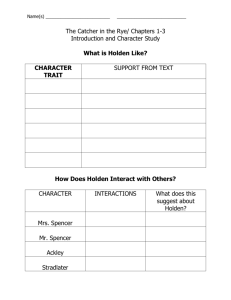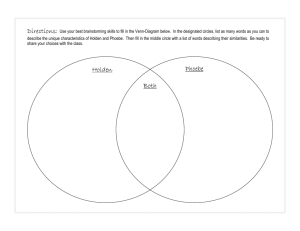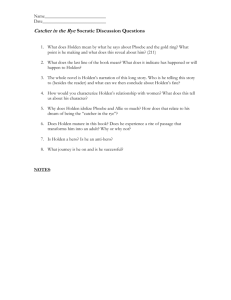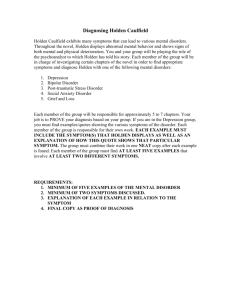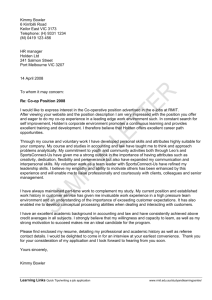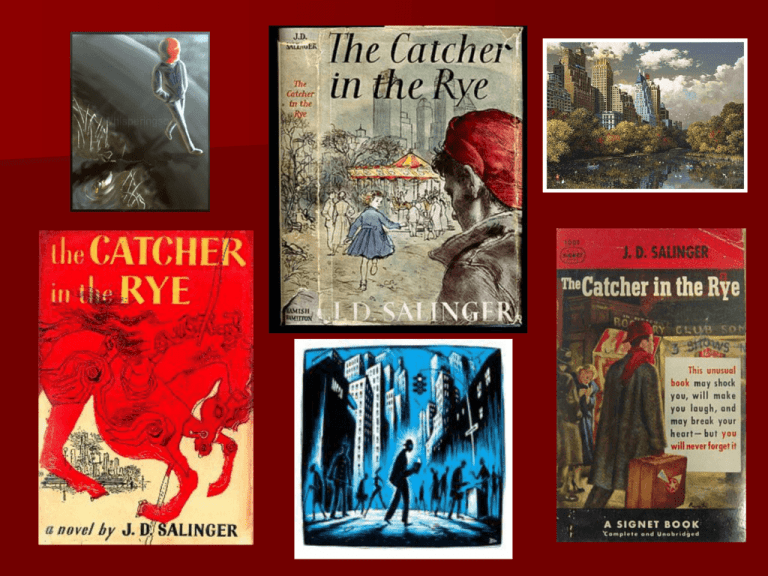
J. D. Salinger
Childhood
(“…all that David Copperfield kind of crap”)
Born Jerome David (Sonny) Salinger on
Jan. 1, 1919, in New York City
Grew up near Central Park in upper
Manhattan
Son of a Jewish father (foods
wholesaler and importer) and
Christian mother
Upper-middle class family
Molding Salinger into a “Splendid,
Clear-thinking Young Man”
Attended two private schools
First was Manhattan’s
McBurney School
Drama, journalism, manager
of fencing team
Flunked out
Next attended Valley Forge Military
Academy in Wayne, PA
Began writing stories
Graduated in 1936
College
Attended New York University for one month in 1936
Was called “the worst English student in the history of the
college” by one of his professors
Quit school at father’s request to go to Austria and Poland
to learn meat and cheese business (venture failed)
Attended Ursinus College (PA), but quit to study fiction at
Columbia University
Military Service
Drafted in 1942
Served with Counter Intelligence Corps
Saw action at Utah Beach, Normandy on “DDay,” and at Battle of the Bulge
Met and corresponded with Ernest
Hemingway
Adult Life
After war lived with parents in New York and
associated with bohemians in Greenwich
Village
By 1950 moved to Cornish, New Hampshire
Married; fathered two children
Writing Career
35 stories, 1 novel, and 4
novellas
The Catcher in the Rye
(1951)
Reputation rests largely on
this novel: It took 10 years
to write
Franny and Zooey, Nine
Stories, Raise High the
Roofbeam Carpenters, and
Seymour: An Introduction
Many of his works revolve
around a fictional family of
geniuses
A Recluse and a Loner
Did not publish any new work since 1960s
Deeply into Zen mysticism
In 1965, Salinger further withdrew from society and
put a 6-foot fence around his property
• Stopped communicating with outsiders
• In 1967 he stopped publishing and
obtained a divorce
• Last interview in 1974
• Died Jan. 27, 2010
The Catcher in the Rye
Published in 1951
Initially reviewed as a “rare miracle of fiction”
Generally received as a literary sensation
Dissenting opinion gradually arose, in
part due to use of profanity
Banned and condemned by some
communities and school boards – it was
the 13th most frequently challenged book of the 1990s
The action is not vital; the psychological state of narrator
is much more important
Book covers a time span of four days
Principle setting is New York City, which plays such an
important part that it can almost be considered another
character in the story
Back Page Preview (1951)
(Possibly written by Salinger)
The hero-narrator of The Catcher in the Rye is an ancient child of
sixteen, a native New Yorker named Holden Caulfield. Through
circumstances that tend to preclude adult, secondhand
description, he leaves his prep school in Pennsylvania and goes
underground in New York City for three days.
The boy himself is at once too simple and too complex for us to
make any final comment about him or his story. Perhaps the
safest thing we can say about Holden is that he was born in the
world not just strongly attracted to beauty but, almost, hopelessly
impaled on it.
There are many voices in this novel: children's voices, adult
voices, underground voices – but Holden's voice is the most
eloquent of all. Transcending his own vernacular, yet remaining
marvelously faithful to it, he issues a perfectly articulated cry of
mixed pain and pleasure. However, like most lovers and clowns
and poets of the higher orders, he keeps most of the pain to, and
for, himself. The pleasure he gives away, or sets aside, with all
his heart. It is there for the reader who can handle it to keep.
So Far: Chapters 1-6
Two crucial points
Holden’s feelings and actions are those of
a very troubled person who deserves our
sympathy more often than our praise.
However, a close look at Holden reveals
that he possesses very strong moral,
compassionate instincts.
He is a good but confused person.
So Far: Chapters 1-6
The issues
Profanity
The way Holden expresses himself reflects his state of
mind: Because he is troubled, his language is often
profane, demonstrating his negativism.
He tempers the negativity a bit: the lower case “g” in
“goddamn” indicates he clearly does not intend to take
the Lord’s name in vain.
He seems to limit his obscenities to those which are
essentially meaningless (we learn later, for example, that
he hates the “F” word.)
So Far: Chapters 1-6
The issues
Lying/dishonesty
Holden’s admission of being a terrific liar also reflects his
troubled mind. He lies for many reasons.
The need to escape boredom; create excitement.
To please others and/or prevent hurt feelings.
But Holden’s lies only serve to intensify his alienation
from others.
His falsehoods are often humorous, but they are more
often pathetic, reminding us of his tragic isolation.
So Far: Chapters 1-6
The issues
Sexual promiscuity
Holden is confused but moral: He admits to having
sexual desires and even submits somewhat to society’s
demands that men be sexually proficient.
Holden thinks a prostitute might provide him with the
“practice” he needs for marriage: He is clearly a virgin.
But guiding all of this is a clear sense of right and wrong.
We learn that when a girl says “stop,” he stops.
And he clearly believes that sex without love is improper.
He simply can’t stand the thought of Stradlater “getting
sexy” with Jane.
Thoughts: Chapters 1-6
Themes and motifs
We will frame our reading and discussion within
the following themes, motifs, etc:
–
–
–
–
–
–
Alienation as a form of self-protection
The pain of growing up
Phoniness
Relationships, sexuality
Loneliness
Symbols
Thoughts: Chapters 1-6
Alienation as a form of self-protection
– It’s ironic that Holden doesn’t turn the microscope on
himself (introspection): He may see that he and
Ackley have much in common.
– Pencey is not a healthy environment for Holden:
Stradlater completely disses Holden’s essay about
Allie’s baseball glove then later beats Holden up.
Ackley is insensitive to Holden’s needs.
Thoughts: Chapters 1-6
Pain of growing up
– Holden seems to fear growing older. Remember his
physical description of Spencer.
– Allie’s death weighs on Holden more than Holden lets on.
Holden’s reaction to Allie’s death was violent and extreme:
He smashed out the windows in the garage. He didn’t
attend the funeral because he was hospitalized. (Holden
also instantly recalls the exact day Allie died.)
– Holden obviously revered his little brother, who sounds
intelligent and unique. He kept Allie’s glove and took it to
school with him.
Thoughts: Chapters 1-6
Phoniness
– Holden hates “phonies.” He thinks D.B. has
prostituted himself in Hollywood; he hates movies
(although he apparently has seen a lot of them);
Pencey seems populated by the very phonies Holden
suppposedly despises, from the teachers to
Stradlater.
– Yet, Holden’s kindness toward these people shows
through when he talks Brossard into letting Ackley
come to the movies with them, and Holden agrees to
write Stradlater’s essay for him.
Thoughts: Chapters 1-6
Relationships, sexuality
– Jane obviously means a lot to Holden. He gets
really nervous thinking that Stradlater (who
doesn’t even get her name right) might make
a move on her in the back seat of a car.
(Remember, Stradlater seems to be pretty
experienced at such things: He’s a “sexy
guy.”)
Thoughts: Chapters 1-6
Loneliness
– That Holden seeks Ackley’s company before
Holden leaves Pencey shows how desperate
Holden is for companionship.
Thoughts: Chapters 1-6
Symbols
– Holden’s red hunting hat: He pretends he doesn’t
care what people think of his appearance (although
there seems to be some insecurity over his height,
weight, and gray hair), but he takes it off when he
wants to downplay his uniqueness (at the football
game; Spencer’s, etc.)
– Allie’s baseball mitt: It’s left-handed, making it
somewhat unique, like Allie. Holden keeps the glove
to himself (although he shows it to Jane) – a symbol
of innocence and childhood (in turn, represented by
Allie).


